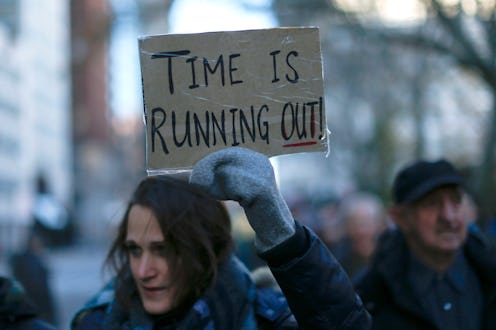News
Women Need A Seat At The Table When It Comes To Climate Change Policy, A New Report Says

While the entire globe is impacted by rising temperatures, women face heightened risks when displaced from their homes or forced to relocate. At the same time, though, a new report from the environmental group the Sierra Club explains that many women have also stepped up as leaders when it comes to tackling climate-related mobility. If environmental policies are ever going to equally address everyone's needs, the report says women's involvement in shaping climate change solutions is vital.
"If one thing is clear from this report, it is that women and communities have the solutions and must have a full and equal role in developing climate policies and self determination in responses to the climate crisis," Jessica Olson, Sierra Club's gender equity and environment campaign representative and the report's author, said in a statement. "The rights of all people grappling with climate migration must be treated with the utmost importance."
Women's voices need to be heard every step of the way when communities form policies and practices surrounding climate-related mobility, the study argues. At the global level, that means giving women delegates, women’s organizations, and gender equality experts a seat at the table. Policymakers should listen to women from communities affected by natural disasters and other climate-related issues. And local women should be involved in their communities' discussions to design, implement, and evaluate displacement or relocation plans.
The United Nations Framework Convention on Climate Change (UNFCCC) has outlined how women are disproportionately impacted by climate change — namely because the biggest environmental burdens fall on the poor and the majority of the world’s poor are women. Its website explains that unequal participation in decision-making processes and labor markets "compound inequalities and often prevent women from fully contributing to climate-related planning, policy-making and implementation."
The Sierra Club's report, published on Tuesday, backs up the UNFCCC's findings and highlights women who are already leading the charge in addressing climate displacement. Lorna Ortillo, for example, organized women from her region of the Philippines to distribute supplies and support the community’s recovery efforts after a devastating typhoon hit in 2013. Since then, she's helped the area become more prepared for future disasters and trained other women to operate lighting and charging systems that run off solar power.
"I realized that no one else was going to step up, and at my age I have the time to serve," Ortillo told the Sierra Club. "I had to because my passion is to help women, their families, and my community."
If poorly managed, families and entire communities moving because of the climate could result in women facing even more human rights violations than they currently do, the report notes. However, well-planned voluntary migration has the potential to foster gender equality, sustainable development, climate adaptation, and disaster risk reduction. If women's voices are included, that is.
It's really just as simple as including women in climate discussions at every level and promoting their leadership. Experts believe their involvement would help mitigate further disasters and create safer communities as more and more people relocate due to climate change.